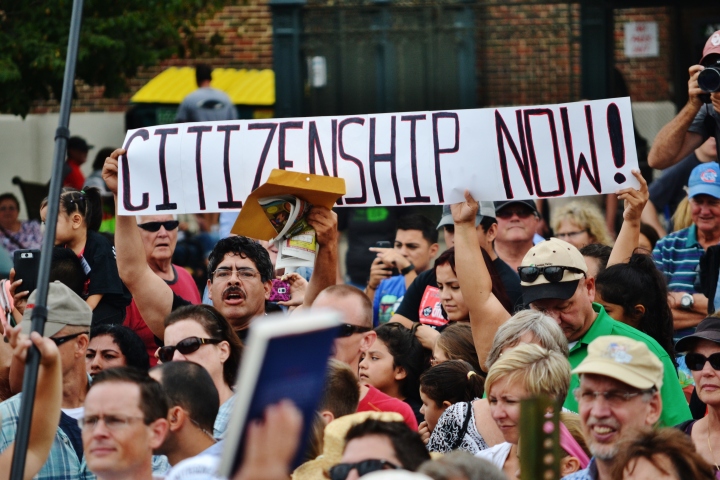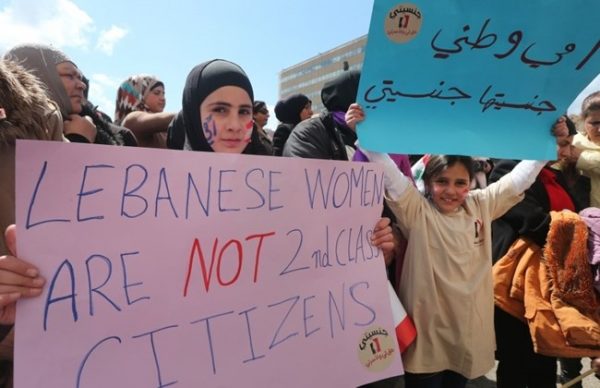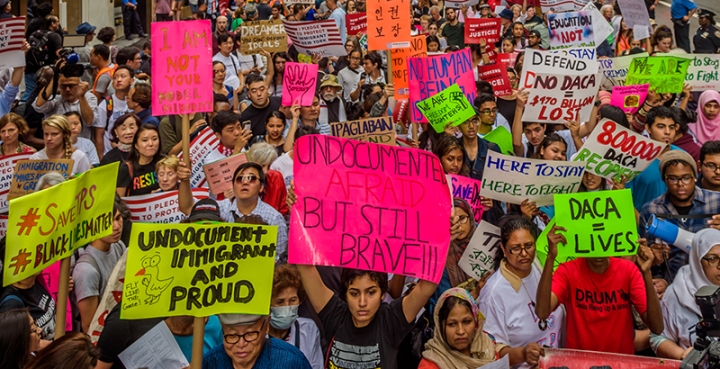
“Citizenship” is a term which does not often undergo questioning or challenging by those who have never had to fight for it. For those of whom, like myself, were born with citizenship, it is often perceived as just another description of our personhood. For instance, I am a mixed-race, multi-ethnic, female-identifying, straight, cis-gendered, American citizen. I want to challenge the term “Citizenship” (as I understand and receive it) on its effectiveness as a category for determining social belonging, and hope that, by the end of this blog post, I will present why citizenship is an inherently exclusionary term.
As practiced in the United States and around the globe, citizenship is driven by an “end goal”—that is, the official recognition of an individual as an equal member of a community. This equal membership includes a person’s right and ability to participate in their country’s politics, workforce, educational system, etc. Citizenship is a status to be acquired, with the validity of such status highly (if not solely) dependent on physical documentation as proof, including: passports, birth certificates, visas, etc. This status also rests heavily on an “outsider-insider” dichotomy; the term “citizen” indicates the fulfillment of certain criteria, thus also including the possibility of non-fulfillment, which is the existence the non-citizen must endure. In other words, “citizen” generates its meaning when posed against the “non-citizen”, or the undesirable “other”.

During lecture last week, students were posed with the question: “What comes to mind when you think of the word ‘citizen’? My first association is the word “birth”. By far the easiest way to achieve citizenship is to be born in a country. Upon birth, one is provided a birth certificate and, through this form, becomes a citizen (it is crucial to note that it is not the birth itself, but the legal process of writing and assigning the certificate—essentially, “performing” citizenship—which allows the baby to become a citizen). From this perspective, citizenship seems like a stroke of luck. It is not surprising, then, that many immigrants will risk nearly everything for their child(ren) to be born in the U.S.. The sons and daughters of immigrants who are born in this country are automatically endowed with the mobility that researchers Fernandez and Olson discuss in their paper concerning Arizona’s Senate Bill 1070, “Critical Exchange on Arizona and the Struggle for Locomotion: To live, love and work anywhere you please” (1). These children bypass the struggles of their parents given a difference in birthplace.
Citizenship becomes further prized as a fortunate occurrence with the development of programs which, though well meaning, exemplify the exclusivity of the category “citizen’. One such initiative is the Diversity Immigrant Visa Program, or “green card lottery”, which 13.3 billion people apply to on average per year. Located on the website of the American Immigration Council is a factsheet concerning the details of the Diversity Immigrant Visa Program, with the following statement written underneath the section “What is a Diversity Visa?”
The diversity visa program makes up to 50,000 visas available each year to natives of eligible countries. The program is well known as the “diversity lottery,” since potential visa recipients are randomly selected from the pool of qualified entries. Yet, being randomly selected—or “winning” the lottery—does not guarantee admission to the United States but rather provides the individual an opportunity to apply for the Diversity Visa. The odds of being selected for this opportunity are very small, with an average of 13.3 million people submitting applications each year (2).
(Italics are my own, bold is not)
In order to obtain for a diversity visa, an individual must first live in one of the “eligible countries” (regions which have sent less than 50,000 immigrants to the U.S. in the past 5 years.). From there, the chance of being selected is not dependent on one’s background, reasons for entering the U.S., or qualifications, but on random selection. If someone is fortunate enough as to be picked, their admission into the United States is not guaranteed. The entire process is aimed towards granting people an opportunity to apply to become a citizen, not to actually become a citizen (however one wishes to even define that process). This is all without discussing the stringent security measures the program requires, which place a burden on immigrants. Another association with the term “Citizen”: luck.
Technically speaking, citizenship stresses identity to a determined location, but not identification with said location, nor participation in a community. Therefore, one need not agree with the political, educational, or economic system of his/her/their determined country. One needn’t be politically active, either (though it is assumed that they will be)(3). Return to: Fernandez and Olson. Towards the end of their essay, Fernandez and Olson highlight the courage of undocumented people marching in protests and participating in meetings:
At these events, they are often open or indifferent about their undocumented status. The risks, they judge, are outweighed by their need to participate. ‘I just can not stop going to every protest and meeting I can’, an undocumented member of the Repeal Coalition told one of us. ‘I just can not get enough of politics’. She is determined to be a political being, regardless of SB 1070 and regardless of the restrictions of liberal citizenship
(Critical Exchange, 417)
Despite the woman’s undocumented status and risk of exposure, she is “determined to be a political being”. She fights regardless of whether or not she is considered a “citizen”, fighting against the exclusivity of the term “citizen” itself. Again, “Citizen” does not often undergo questioning or challenging by those who have never had to fight for it. But for those who have had to, there exists a constant struggle of claiming one’s right to be in a country which has not granted them the ability to participate in politics, to work legally. In short, to be an equal member of society.

In summary, “Citizenship places an “insider-outsider binary”, which forces those who are not categorized as citizens to fight their way to the inside, even if remaining there isn’t their final wish, as Olson and Fernandez mention in their study (415). Rather than view immigration in terms of categories such as “citizen” and “non-citizen”, what if we were to question the notion of citizenship itself, and why it excludes so many individuals from participating in their communities (or at least, their communities for that point in time, for the immigrant does not have a singular “home”), and being fully recognized as equal members of their society? Even if U.S. politicians are far from recalling the word “citizen”, there are surely many brave immigrants who are willing to continue their fight against the exclusionary citizenship process. And this American citizen stands with them.
Notes:
- Contemporary Political Theory (2011) 10, 412–419. doi:10.1057/cpt.2011.15
- “The Diversity Immigrant Visa Program: An Overview.” American Immigration Council, American Immigration Council, 13 Nov. 2017
- Though there is not enough space to cover this topic in my post, it is worth mentioning that, socially speaking, citizenship applies pressure on the citizen to feel gratitude, respect for, and patriotism towards their country. For immigrants seeking residence in the U.S., this demands the immigrant’s ability to disconnect from their original home, and eagerness to adopt the American lifestyle. This provides another association for the term “Citizen”: forced cultural assimilation.
